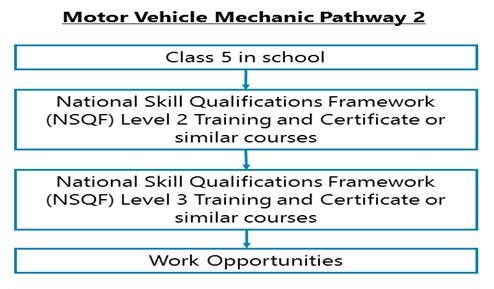Motor Vehicle Mechanic
Entry Level Qualification
8
Career Fields
Mechanic & Technician
For Specially Abled






Career Entrance Exam
About Career
As motor Vehicle Mechanic, you will work on the mechanical, electrical, and electronic parts of motor vehicles including engine, brakes, clutch, transmission, suspension systems, electrical systems, electronic sensors, mechatronic systems, etc. You need to fix, maintain, reassemble, replace, repair and overhaul these mechanical, electrical and electronic components and systems according to the needs and demands of the customers.
You will have to inspect and test vehicles. You will deal with engine failures, mechanical, electrical, electronic, and mechatronic systems malfunctions, body damage etc. You will also carry out routine maintenance of all these vehicle components, parts and systems from time to time. You will also have to look after cleaning, washing, painting and final appearance of the vehicle after completing your repair and maintenance services. You usually need driving experience to do this job as you may need to test drive the vehicles yourself before starting with your repair services and also after the repair and maintenance work is completed.
Key Roles and Responsibilities:
As a Motor Vehicle Mechanic, you will be engaged with one or more of the following roles and responsibilities: -
1. Discussing with customers to understand the vehicle problems.
2. Test-driving vehicles and checking systems/components of the vehicle to find faults and defects.
3. Following instructions from supervisors regarding which automobile parts to restore or replace.
4. Installing replacements using mechanized tools and hand instruments.
5. Repairing, relining, replacing and adjusting brakes, transmission systems, power systems, steering systems, window systems, batteries, ignition, etc.
6. Removing damaged sections of vehicles using metal-cutting guns.
7. Performing required maintenance services, such as lubrication, oil changes, oil filter changes, part replacement, etc.
8. Running and testing repaired or replaced parts to check if they fit and work properly.
9. Test driving vehicles before and after repair and maintenance work.
PARTICULARS | DESCRIPTION |
Name | Motor Vehicle Mechanic |
Purpose | Services Motor Vehicles |
Career Field | Mechanic & Technician |
Required Entrance Exam | No Entrance Exam |
Average Salary | 100000 - 200000 Rs. Per Year |
Companies For You | Quality Inspector, Assistant Workshop Manager, & Many More |
Who is Eligible | Any One |
Career Entry Pathway
Class 5 with any subjects –NSQF Level 2Training and Certificate or similar courses
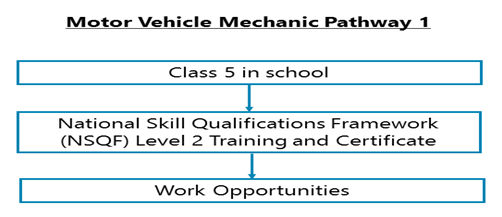
After completing Class 5with any subjects, you need to undergo National Skill Qualifications Framework (NSQF) Level 2 Training and Certificate for ‘Basic Automotive Servicing 2 wheeler3 wheeler’ (500); ‘Basic Automotive Servicing 4 wheeler’ (500); ‘Driver cum Mechanic’ (600) or similar courses. The numbers in brackets are the total number of training hours for each course.
Class 5 with any subjects – NSQF Level 2 Training and Certificate or similar courses - NSQF Level 3 Training and Certificate or similar courses
After completing Class 5 with any subjects, you need to undergo National Skill Qualifications Framework (NSQF) Level 2 Training and Certificate for ‘Basic Automotive Servicing 2- wheeler 3-wheeler’ (500); ‘Basic Automotive Servicing 4 wheeler’ (500); ‘Driver cum Mechanic’ (600) or similar courses. Then you can go for National Skill Qualifications Framework (NSQF) Level 3 Training and Certificate for ‘Repair & Overhauling of 2 wheelers & 3 wheeler’ (600); ‘Repair & Overhauling of Chassis systems (LMV & HMV)’ (600); ‘Repair & Overhauling of engine system’ (600) or similar courses. The numbers in brackets are the total number of training hours for each course.
Class 8 with any subjects – NSQF Training and Certificate in ‘Automotive Service Technician Level 3’ related trades
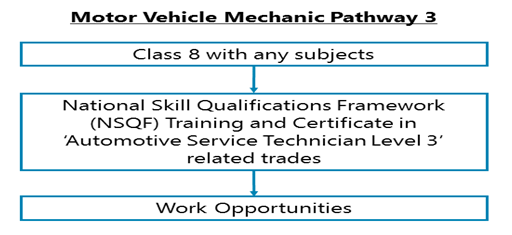
After completing Class 8 with any subjects, you can pursue National Skill Qualifications Framework (NSQF) Training and Certificate inthe following or similar trades:‘Automotive Service Technician Level 3’ (350); ‘Repair - Welder’ (400); ‘Spare parts Operations Executive Level 3’ (300) or similar courses. The numbers in brackets are the total number of training hours for each course.
Class 10 all subjects as per scheme of studies- training at an ITI or similar institutein ‘Mechanic (Motor Vehicle)’ or related trades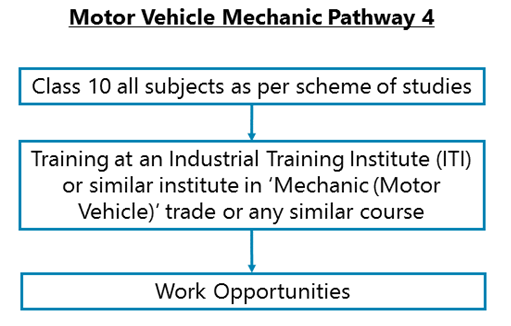
After Class 10, you need to undergo training at Industrial Training Institute (ITI), National Skill Training Institute (NSTI), Regional Vocational Training Institute (RVTI), National Vocational Training Institute (NVTI), Industrial Training Center (ITC) or other vocational institutes in ‘Mechanic (Motor Vehicle)’, Mechanic (Repair and Maintenance of Heavy vehicles), Mechanic (Repair and Maintenance of Light vehicles), Mechanic (Repair and Maintenance of Two Wheeler)or any similar course. After completing this training, you will sit for All India Trade Test (AITT) and you will get a National Trade Certificate (NTC) if you pass.
Class 10 all subjects as per scheme of studies – NSQF Level 4 Training and Certificate for ‘Automotive Service Technician (Two and Three)’ or similar courses
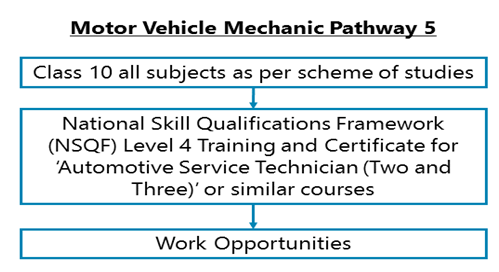
After Class 12, you can pursue National Skill Qualifications Framework (NSQF) Training and Certificate in the following or similar trades:‘Automotive Electrician Level 4’ (400) if you have Chemistry in Class 11-12; or similar courses. The numbers in brackets are the total number of training hours for each course.
Required Qualification & Competencies
After Class 5, you can do the following:
1. National Skill Qualification Framework (NSQF) Training and Certificate courses.
2. Finish school till class 8 to go for higher level training and certifications.
After Class 8, you can do the following:
1. National Skill Qualification Framework (NSQF) Training and Certificate courses.
2. Finish school till class 10 to go for higher level training and certifications.
After Class 10, you can do the following:
1. Training at an Industrial Training Institute (ITI) or a similar institute.
2. National Skill Qualification Framework (NSQF) Training and Certificate courses.
3. Ministry of Labour& Employment (DGE&T) Training and Certificate under CTS.
4. Finish Class 11-12 and then go for NSQFTraining and Certificate courses
After Class 12, you can do the following:
1. National Skill Qualification Framework (NSQF) Training and Certificate courses.
Various private/public vocational training establishments across India offer these or similar courses on:
1. Mechanic (Motor Vehicle)
2. Mechanic Motor Cycle
3. Mechanic Motor Vehicle
4. Motor Vehicle Body Builder
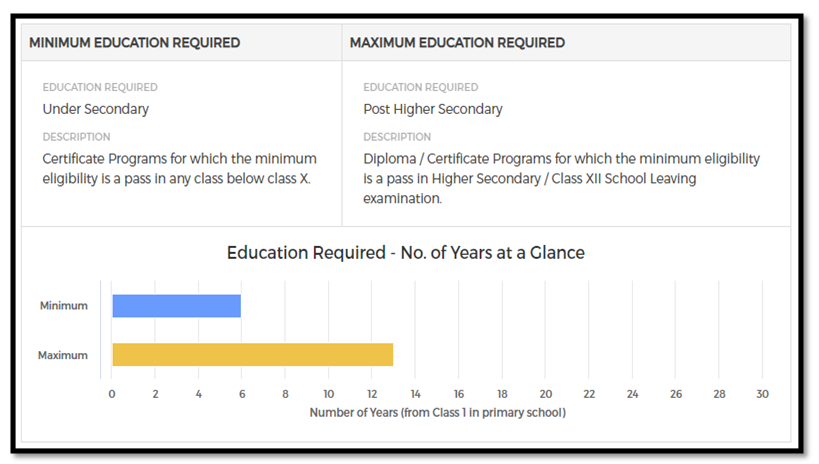
Competencies Required
1. You should have interests for Realistic Occupations. Realistic occupations involve more practical and hands-on activities than paperwork or office work. Realistic occupations often involve physical activities for getting things done using various tools and equipment.
2. You should have interests for Conventional Occupations. Conventional occupations involve repetitive and routine tasks as well as fixed processes or procedures for getting things done. These occupations involve working more with data, systems, and procedures and less with ideas or creativity.
3. You should have Machine Repair and Maintenance Skills- performing repair and maintenance of different machines, equipment, and devices.
4. You should have Active Listening Skills- Giving full attention to what other people are saying, understanding the points being made by others, asking questions, etc.
5. You should have Problem Solving Skills- analysis and understanding of problems, evaluating various options to solve the problems and using the best option to solve the problems.
6. You should have Supervising Skills- Supervising and monitoring the performance of others, businesses, and different projects.
7. You should have Process and Operation Controlling Skills- controlling processes and operations of various machines, equipment, devices and systems using different types of electrical and electronic control instruments and systems.
8. You should have Manual Dexterity - The ability to quickly move your hand, your hand together with your arm, or your two hands to grasp, manipulate, or assemble objects.
9. You are always or mostly careful about your actions and behaviour.
10. You are practical always or in most situations.
11. You are always or mostly disciplined in your action and behaviour.
12. You are calm always or in most situations.
13. You are always or mostly organized in your day-to-day life and activities.
Career - Job Opportunities & Profiles
1. You can get job roles like Motor Mechanic, Clutch Specialist, Brake Specialist, Motor Vehicle Technician, Diesel Truck Mechanic, Operator cum Mechanic, Auto Mechanic etc.
2. You will get work opportunities mostly at the vehicle service centers run by the distributors and seller of automobiles. All vehicle manufacturing companies appoint distributors for selling automobiles. Most of the distributors also run service centers.
3. Apart from distributors’ service centers, vehicle manufacturing companies also authorize many service centers to offer servicing and maintenance of vehicles manufactured by them. You may get work opportunity in such a service center.
4. Besides the above, there are many other independent vehicle service centers which operate all over the country. You may get to work with these service centers as well.
Career Growth
From entry-level job positions as a Motor Mechanic, Clutch Specialist, Brake Specialist, Motor Vehicle Technician, etc. you may get higher roles like Service Specialist, Master Mechanic, Senior Technician, Junior / Senior Supervisor, Quality Inspector, Assistant Workshop Manager, Senior Trainer, Trainer-in-Charge, Workshop Manager, etc.
Salary Offered
1. Salaries vary according to job profiles and the kind of facilities you get to work at.
2. In the entry level jobs, you may expect to earn between Rs.8000 –13,000 per month.
3. Salaries increase with your work experience and as you get promoted.
4. With 2-6 years of work experience, you may expect between Rs 9,000 –22,000.00 per month.
5. With 8-12 years of work experience, you may expect between Rs 12,000 –35,000.00 per month.
6. In the senior-level expert technician jobs, with 12-15 years of work experience, you may expect to earn between Rs. 15,000 – 50,000 or even more per month.
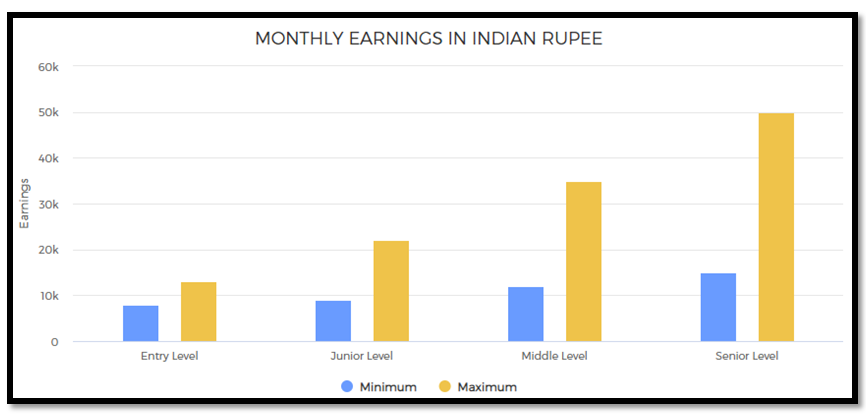
Monthly Earnings In Indian Rupee

1. Entry level: 0 - 2 years of work experience
2. Junior Level: From 1 to 12 years of work experience
3. Mid Level: From 5 to 20+ years of work experience
4. Senior Level: From 10 to 25+ years of work experience (there could be exceptions in some high-end technical, financial, engineering, creative, management, sports, and other careers; also in the near future, people will reach these levels much faster in many careers and in some careers, these levels will have no meaning as those careers will be completely tech skill driven such as even now, there is almost no level in a Cyber Security Expert’s job)
Work Activities
As a Motor Vehicle Mechanic, you will be:
1. Operating machines, equipment, devices, systems and processes - Using various methods and techniques to operate machines, equipment, devices, systems,and processes in industrial and other settings.
2. Getting Information and learning - Observing, hearing, reading, using computers, or otherwise obtaining information and learning from it.
3. Handling and moving objects and materials - Using hands or otherwise use physical strength to handle and move objects and materials; manoeuvre, install, lift, place, manipulate, etc.
4. Operating vehicles, mechanized devices, or other movable devices - Running, maneuvering, navigating, or driving vehicles or mechanized equipment, such as forklifts, passenger vehicles, aircraft, or water craft.
5. Inspecting equipment, systems, structures, and materials - Inspecting equipment, systems, structures, and materials to ascertain quality, performance, defects, causes of errors, etc.
6. Performing physical activities - Performing physical activities that require the use of your arms and legs and moving your whole body, such as climbing, lifting, balancing, walking, stooping, and handling of materials.
7. Communicating with co-workers and others - Communicating with people in writing, verbally or otherwise inside your workplace and various other people who have professional relationships with your place of work including vendors, government officials, etc. or with people at large.
Future Prospects
The future looks bright for Motor Vehicle Mechanics. Experts are forecasting India to cross annual sales of 5 million cars. Passenger vehicle sales grew 28% from 2.5 million to 3.2 million. Car ownership in India has increased wildly and irreversibly. India’s automobile industry in India is the fourth largest in the world today. Domestic automobiles sales grew at 7.01 percent compounded with close to 24 million vehicles being sold. India is expected to break into the top three markets for light vehicles surpassing Japan with sales of about 5 million units.
The Indian market has grown approximately 8.6% to about 4 million units. Indian automotive industry is predicted to touch the Rs 16.16-18.18 trillion mark. Two-wheelers are dominating the industry with about 81% share in the domestic automobiles segment. With technologies supporting Green Tech, Engineering, Research, and Development(ER&D) is scaling up manifold. offshore ER&D market value in this sector will be around 17 billion US Dollars with India’s share expected to rise to 45-55 percent.

Future Prospects At A Glance


